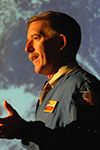Exploration: the importance of expanding our knowledge base and pursuing new horizons
Jim ReillyAstronaut and Geologist, Mach25Management, LLC
The APPEA Journal 55(3) - https://doi.org/10.1071/AJ14139
Published: 30 June 2015
Abstract
What defines exploration? The simplest response could be: finding an answer to a question that doesn’t have an answer yet. Another could be: defining new horizons past the current ones that limit our vision. When we cross those limits of what we know to find out what we don’t know we often find answers to questions we didn’t know to ask. In so doing, we define new and different horizons opening new frontiers rather than just moving into ‘more of the same’ extending the same horizon.
Exploration pushes the frontiers of our knowledge. What do we know? What do we not know? More critically, what are we completely ignorant of? Exploration often doesn’t result in ‘I’ve done it!’ but an observation that ‘something’s funny about that….’ Followed by the question: ‘What good is it?’ ‘I don’t know but it’s an elegant result, don’t you think?’ Discoveries usually result in changing our lives in truly remarkable ways.
For the past 50 years we have been pushing the frontiers of our knowledge by exploring space. We now have a unique research facility in orbit that was created not by one nation, but a family of nations. Work being done there every day will test and develop new processes leading to new industries or applications here on Earth. In spite of that, one of the most important outcomes of building to the ISS is we have trained three generations of engineers to do things that have never been done before. This knowledge leaks into other technologies and systems and changes how we approach problems here.
We must never stop pushing our frontiers. A sense of wonder at what we discover is a most satisfying emotion and may change everything about our lives here on Earth.

Born at Mountain Home AFB, Idaho, James (Jim) Reilly spent most of his life in Texas, graduating from Lake Highlands High School in Dallas. He attended the University of Texas at Austin, then the University of Texas at Dallas, where he earned his Bachelor of Science in 1977, Master of Science in 1987, and PhD degrees in Geosciences. After receiving his Bachelor of Science degree in 1977, Jim entered graduate school and was selected to participate as a research scientist specialising in stable isotope geochronology as part of the 1977–78 scientific expedition to Marie Byrd Land, West Antarctica. In 1979, he accepted employment as an exploration geologist with Santa Fe Minerals Inc., in Dallas. From 1980 to the time he was selected for the astronaut program, Jim was employed as an oil and gas exploration geologist for Enserch Exploration Inc., in Dallas, rising to the position of Chief Geologist of the Offshore Region. Concurrent with his duties as an exploration geologist, he was actively involved in the application of new imaging technology for industrial applications in deep water engineering projects and biological research. As part of this work, Jim has spent approximately 22 days in deep submergence vehicles operated by Harbor Branch Oceanographic Institution and the US Navy. Selected by NASA in December 1994, Jim reported to the Johnson Space Center in March 1995 and completed a year of training and evaluation, qualifying for flight assignment as a mission specialist. Jim flew on STS-89 in 1998, STS-104 in 2001, and STS-117 in 2007. He has logged more than 850 hours in space, including five spacewalks totaling more than 31 hours. He has worked both on the ISS and Mir space stations. Concurrent with his crew assignment he served in support of program and mission teams for the Astronaut Office as lead on Shuttle training, lead for Crew Interface development for the ISS, Shuttle Avionics Integration Lab, Payloads and Procedures Operations lead for the Astronaut Office ISS Branch, and Crew Systems and Landing Operations lead for the Constellation Project team. As an officer in the US Navy Reserve, he is qualified as a Naval Astronaut, Space Cadre expert, and Engineering Duty Officer. He has served on the USS Eisenhower (CVN-69), USS George Philip (FFG-19), USS Oriole (MHC-55), and is currently assigned to the Navy Cyber Forces Command as a Space Operations Course developer and instructor. He holds Top Secret/SCI and program security clearances and works directly with all aspects of fleet operations related to space assets and techniques. In December, 2009, Jim joined the American Public University System as the Dean of the School of Science and Technology, where he managed seven programs in Information Technology, Environmental Science, Mathematics, Science, Space Studies and Engineering, eventually becoming Associate Vice President Strategic Relations, STEM Programs. He is currently an instructor with Delta Solutions and Strategies in Colorado Springs where he teaches Space Science and Operations courses as part of the USAF National Security Space Institute, Space 200 Professional Development Curriculum. In addition, he owns Mach25Management, LLC, a consultancy specialising in marquee events in leadership, teamwork and communications training to corporate, law enforcement, and public sector organisations. He also is active in promoting STEM programs in national and international settings. He currently resides in Colorado Springs with his wife Allison, where they enjoy flying, hiking, camping, mountain climbing, skiing, fishing and hunting. Since 2009, he and Allison have been active in the National Ski Patrol, serving as volunteer patrollers at Ski Cooper near Leadville, CO. |


